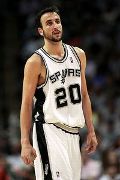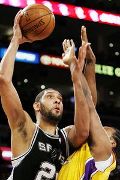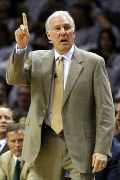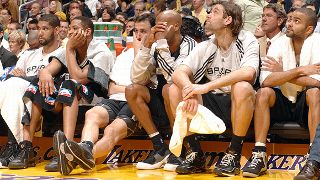|
1. The Spurs didn't make the Finals this season. What are the main reasons? Henry Abbott, TrueHoop: Manu Ginobili's inconsistent play, which is undoubtedly related to fatigue and injury, and some bad timing in which the Spurs' normally excellent role players -- Robert Horry, Michael Finley, Bruce Bowen, Brent Barry -- took turns being really, really cold when it mattered. Also, the Lakers are an excellent team. J.A. Adande, ESPN.com: Sometimes there's a fine line between "experienced" and "old," and the Spurs appeared to tiptoe past it in these playoffs, getting blown out by New Orleans three times on the road and getting out-hustled by the Lakers in their own building in Game 5. Another reason would be the lack of consistent production from their role players. Robert Horry hasn't made a shot so far this series. Two starters didn't score in Game 5. As Hubie Brown would say, you cannot have that. Chris Broussard, ESPN The Mag: Age has had a slight impact. Tim Duncan is still a super-elite player but he has lost a step, and Bruce Bowen and Michael Finley, while still effective, have lost a bit as well. Also, the Lakers improved drastically, as did New Orleans. Simply put, San Antonio is no longer the best team in the West. L.A. is. Ric Bucher, ESPN The Mag: The age and athleticism issues we've been talking about for the past few years finally came to bear. John Hollinger, ESPN.com: If the Spurs don't make the Finals, it won't be because of a non-call at the end of Game 4. No, the reason instead will be the 20-point lead they blew in Game 1 and, more generally, the fact they ran into a team with younger, fresher legs and didn't have enough left in the tank to respond. With Manu worse than 100 percent and the other role players showing their age, they weren't quite good enough this time around. Chris Sheridan, ESPN.com: It won't be because of Joey Crawford or any other peripheral issue. It'll be because they met their match -- just like two years ago against Dallas. The Lakers deserve credit here. They've played well ... except for those final 30 seconds in Game 4.
2. How much longer do you expect the Spurs' big three to play at a high level? Abbott: At least three years. John Hollinger will tell you big men last longer, and Tim Duncan is in perfectly good shape as far as I can tell. He's 32 and he'll be elite for at least three more years, I'd assume. Ginobili is the biggest worry: He's injury prone and a wing who has to be athletic to be most effective. But he's turning only 31 this summer. Plus, he can shoot and he has plenty of size for his position, so he'll age better than most. And Parker is a baby.  Adande: If these playoffs are any indication, the Spurs will be down to a Big 2½ in the next couple of years. Duncan is still capable of putting up big numbers and his game isn't based on athleticism, so age won't affect him the way it did, say, Shaquille O'Neal. Tony Parker just turned 26 and is as fast as ever. But the accumulated wear and tear of all those extra playoff games, plus international competition, appears to be catching up to Ginobili -- especially on defense, where he no longer is the roving X factor he used to be. Broussard: Patrick Ewing, Hakeem Olajuwon and Moses Malone all had their last "20-10''-type seasons at (roughly) 34 years of age, so the 32-year-old Duncan's probably got two, maybe three, seasons left at this level. Having a great, young (26) point guard like Tony Parker will help keep him at a high level. Ginobili, who'll be 31 this summer, is probably on a similar timetable to Duncan, so I'll give them at least two more years at close to this level, but to win another title, they're going to have to have better pieces around them. Bucher: The only question mark is the cumulative effect of Manu Ginobili's injuries. Tim Duncan never lived off his athleticism, so even if that is diminishing, it shouldn't have a significant impact on his effectiveness. Tony Parker is still improving. They should have at least two more seasons as a championship-caliber core. Hollinger: I'd expect each of them to have at least a couple more
good years in them. Ginobili had the best season of
his career this year and Parker is only 26, so it's
not like imminent declines are coming from either of
them. Duncan, at 32, remains one of the league's most
effective players, and players of his size and build
tend to age well. So I doubt any of them will slip
radically over the next two years. Sheridan: Duncan has slipped very little. And Parker still has 90 percent of his speed, and Manu merely has ankle issues holding him back. I see them staying at a high level through 2012.
3. What will be the Spurs' biggest issues going forward? Abbott: There is no crisis, just really good competition and a need for some of the pieces in the pipeline to start contributing (like Rodney Stuckey and Amir Johnson will be doing for the Pistons -- a team in a similar spot). The Spurs let Luis Scola get away. And they might be losing Tiago Splitter to Tau. So that puts a lot of pressure on the likes of Ian Mahinmi, Ime Udoka and new youngsters who might join the roster to really be able to play. In the past, those guys weren't really needed. Adande: The Spurs are so businesslike, it makes sense that one of their issues could be found in the currency tables of the Wall Street Journal; the declining dollar makes it less appealing for foreign draft picks to come here when they could be getting paid in Euros. And as other teams catch up with them they won't have the built-in edge to attract NBA free agents they enjoyed when they were closer to a title than anyone else. Finally, if home court is going to continue to make such a difference in the playoffs, the Spurs won't be able to stick with their strategy of rationing out minutes to the veterans and cruising a little in the regular season to keep everyone fresh. They'll have to fight for top seeds like everyone else. Broussard: The Spurs are going to have to put better players around their big three. They're going to have to get younger and more athletic, and they'll need to get a better power forward to match up with David West in N.O., and Pau Gasol (who will move to the 4 when Andrew Bynum returns) or Odom in L.A.  Duncan won't be able to carry that frontline by himself anymore. He needs a PF who can give him good rebounding and a little scoring. Bucher: The Spurs have structured their contracts so that only Parker and Duncan are under contract for the summer of '10, when a dozen or more superstars -- Kobe, who has great admiration for the San Antonio organization, included -- could be available. So the biggest question they face is, how much do they invest in potential free agents, and thereby impinge upon their cap flexibility, between then and now? Hollinger: Their three biggest problems are age, age and age.
Every Spurs role player is on the wrong side of 30.
All of them. And they're fading fast. Michael Finley
is a shell of what he was. Robert Horry is done,
finito, over. Bruce Bowen (36), Brent Barry (36) and
Fabricio Oberto (33) got next. Even Ime Udoka is 30,
and he's the young whippersnapper on this bench. The
Spurs need to rebuild the entire roster outside of the
three-man core over the next two years; while they've
given themselves plenty of cap flexibility to do it,
it's a massive undertaking. Sheridan: They need a young big man and an athletic 3. I am not ready to say that Ian Mahinmi and Tiago Splitter are the answers.
4. The Spurs have talked about keeping this core together through (at least) 2012. How many NBA titles will they win from now to then? Abbott: Darn it, my crystal ball is still not working! I'll guess one, but anything from zero to three would not surprise me. Adande: The Spurs could get one more championship in that window. They will have to be opportunistic because the next three to four years should belong to the Lakers, with the Hornets, Jazz and possibly Blazers in the Western Conference elite mix as well. Maybe they'll catch a break (they're owed one after the Derek Fisher non-call) or benefit from a key injury on another team. They'll be a fixture in the second round, but will need things to go their way to advance. Broussard: Like I said, it depends on who they add to their core. As they are, they probably won't win another ring. But I'll give them one more title through 2012 just because "you can never count them out'' and, I'm assuming, they'll make smart personnel moves. Bucher: On their every-other-year schedule, two more, but even the Spurs don't believe they can keep that run going. That said, they are simply too smart as an organization for anyone to suggest they can't claim one more Larry O'Brien bauble before we see Duncan and Popovich ride off into the sunset together. Hollinger: The Duncan-era Spurs might very well have another title
left in them. Remember, this is one of the league's
shrewdest organizations, and I have little doubt R.C.
Buford, Gregg Popovich and company can figure out how
to get some new pieces to replenish the aging ones. The problem is that it might take a couple of years to get
it all sorted out, and in the meantime the Lakers,
Jazz, Hornets and Blazers all will be ascendant in the
West. Sheridan: At least one. And I am not counting them out of this series yet. But they'll be a high-level team at least until then, and they have a knack for winning tight games.
5. How do the Spurs rate among the greatest franchises of the past three decades? Abbott: Part of being a "great franchise" is capturing the imagination of a national audience, and on that score they are among the worst champions ever and rank so far behind the Bulls, Lakers, and Celtics that you'd need binoculars to see them. But they don't care. This franchise under Gregg Popovich and Tim Duncan has always been about playing the best basketball, and on that score you simply have to put them up there with the very best.  Adande: They go sixth, behind the '80s Lakers, the '80s Celtics, the '90s Bulls, the three-peat Lakers and the underrated Pistons Bad Boys teams. Duncan deserves credit for being the mainstay of so many good teams, but the full Spurs lineup couldn't match the talent on those other squads. Their most admirable trait has been their stability, a testament to the mind-set of the players and coaches and the front office's ability to manage the payroll. But that isn't an awe-inspiring trait. Broussard: On the court, the Lakers are easily the NBA's finest franchise over the past three decades. Chicago's great just based on the Jordan Era, but San Antonio is right there after that. They were solid in the late '70s/early '80s with The Iceman, very good in the late '80s/early '90s with The Admiral and great in the late '90s/2000s with Duncan. They haven't had the long droughts of weak play that have plagued Chicago and Boston and Detroit. Off the court, the Spurs are great in terms of professionalism, character, etc. Bucher: A top-five franchise, along with Lakers, Celtics, Pistons and Bulls. Sure, they haven't won back-to-back titles, but maybe that's a reflection of overall increased league parity more than the Spurs' being unworthy of entrance to Valhalla. In the five years since the Lakers' three-peat, seven different teams have been in the Finals. If the Lakers and Celtics advance, it will be nine different teams over a six-year span. From a cursory glance at the NBA Guide, I didn't see a five-year stretch that ever saw that much Finals turnover. Hollinger: The fact San Antonio never repeated will be held
against it, but four championships in nine years is
impressive no matter how you slice it. While these
Spurs can't hang with the Shaq-and-Kobe three-peat or
the Lakers and Celtics teams from the '80s, I'd put
them up against any other team from the past three
decades. So let's call them the fourth-best dynasty of
the post-merger era. That's not too shabby for a
little outpost in south Texas. Sheridan: It's telling that the franchise other teams most try to emulate is the Spurs -- it speaks to what a class act they've been on and off the court for the past decade-plus. In terms of greatness over the past 30 years, I'll rank 'em behind the '90s Bulls and the '80s Lakers and Celtics, a notch ahead of the Bad Boys Pistons.
|

